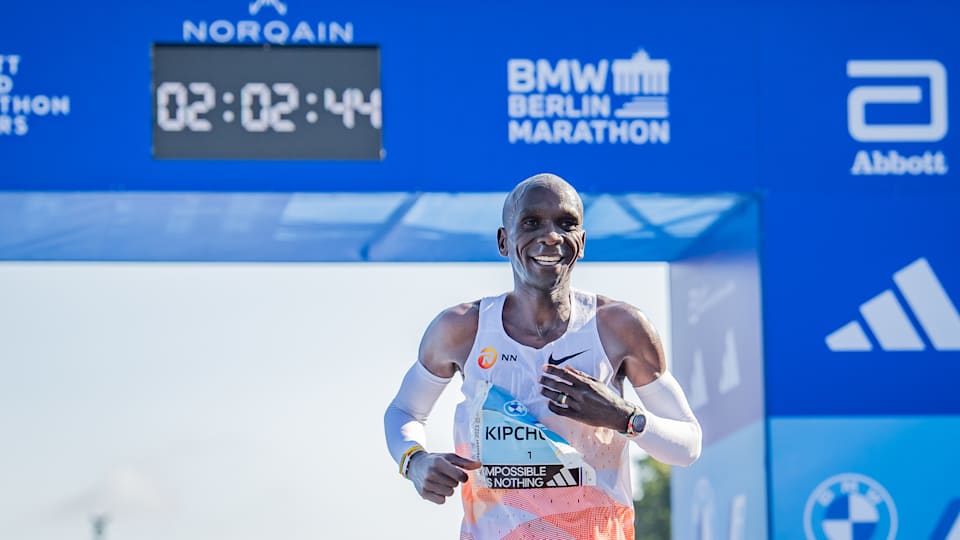Eliud Kipchoge 2023 Berlin Marathon breakdown: How did the Kenyan legend’s race compare to his world record?
Olympics.com looks at both races side-by-side to see just how close Kipchoge was to breaking his best-ever mark of 2:01:09.

After Sunday’s race where he streaked to victory in 2:02:42, Eliud Kipchoge is the undisputed king of the Berlin Marathon.
The fastest marathoner of all time now has a record five victories on the streets of Berlin - overtaking Ethiopian great Haile Gebrselassie for the most wins ever.
This 2023 triumph comes just a year after the Kenyan set the world record on the same course, when he came home in 2:01:09 to break his previous best by 30 seconds.
And while a slower second half of his 2023 race scuppered any chance of that record being broken, Kipchoge did prove that he is still a formidable runner over the mythical 42.195km distance with the eighth-fastest time ever.
A closer look at those stats also show that Kipchioge remains the most consistently fast marathon runner in history, with five of the top 10 times ever run.
Sunday’s marathon was the 38-year-old’s slowest within that 10 and only his third-fastest in Berlin after his world records last year and in 2018 when he crossed the line in 2:01:39.
So is it fair to say the two-time Olympic marathon champion is showing signs of slowing? And if so, where is he most vulnerable to losing time in a race?
Find out all the answers below.
Are there chinks in the armour of all-time great Eliud Kipchoge?
For someone who has now won 16 of the 19 marathons he has competed in, Kipchoge has no real rivals in the conversation about the greatest marathon runners of all time.
However, this race may just have given the most important indication yet that his legendary running skills are ever so slightly on the wane.
In a race that played out in close-to-ideal weather conditions, Kipchoge’s first 5 km was actually completed two seconds faster than his world record in 14 minutes and 12 seconds. By 10 km he was just four seconds off world record pace but by 20 km - almost the halfway point - that gap had extended to 28 seconds.
However, it was in the second half of the race that the world record relay began to slip away from Kipchoge. By 30 km the gap to the record was 45 seconds, which extended to a full minute by kilometre 35. That five km split was followed by Kipchoge’s slowest of the entire race, timed at 14 minutes and 56 seconds, 13 seconds slower than his split at the same distance the year before.
By the end of the race, victory was secured for Kipchoge but while the first half was raced at the second-fastest speed of all time, the final half marathon left him one minute and 34 seconds away from his year-old world record.
Kipchoge's 2023 Berlin Marathon times vs his world record
What’s next for Eliud Kipchoge?
Kipchoge’s most likely scenario for the next year would be a spring marathon - perhaps Tokyo or London, followed by the chance to defend his Olympic title at Paris 2024.
On this showing, the Kenyan remains a favourite to be picked for his nation for the Olympics but he may also go there without a world record to his name after the stunning emergence of compatriot Kelvin Kiptum whose time of 2:01:25 set in London earlier this year is just 16 seconds off the world record.
Does he have what it takes to beat Kipchoge’s best mark having set the fifth and second-fastest times in his first two marathon attempts?
Whatever happens, the mouthwatering prospect of seeing Kipchoge attempt to become the first man to win three Olympic marathon titles is sure to be one of the highlights of the Paris Games. And the potential battle with the 23-year-old Kiptum might just prove to be the legend’s greatest challenge yet.
